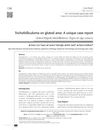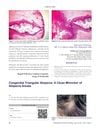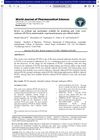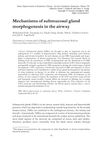
Karunjchirakam Chooranam significantly improved symptoms in most PCOS cases.
May 2023 in “MQRInvestigar” A young dog with an enlarged prostate and cysts improved significantly after treatment and surgery.
 151 citations,
December 2004 in “Annals of the New York Academy of Sciences”
151 citations,
December 2004 in “Annals of the New York Academy of Sciences” Congenital Adrenal Hyperplasia is a genetic disorder with two forms, causing symptoms like early puberty and severe acne, but can be identified through screening and treated with glucocorticoids.
 2 citations,
February 2021 in “Endocrinology, diabetes & metabolism case reports”
2 citations,
February 2021 in “Endocrinology, diabetes & metabolism case reports” A teenage girl had both a rare ovarian tumor and a severe form of polycystic ovarian syndrome.
 September 2022 in “TURKDERM”
September 2022 in “TURKDERM” A rare benign skin nodule was found on the buttock, a unique location for this condition.
 November 2020 in “International journal of contemporary pediatrics”
November 2020 in “International journal of contemporary pediatrics” Two siblings had a rare immune disorder caused by a FOXN1 gene mutation.
June 2023 in “Dermatopathology” A woman had a unique skin growth with hair follicle, oil glands, fat cells, spindle cells, and nerve fibers.
 January 2025 in “Indian Dermatology Online Journal”
January 2025 in “Indian Dermatology Online Journal” Treatment reduced cystic lesions but didn't change existing Nevus Comedonicus.
1 citations,
January 2022 in “Journal of veterinary diagnostic investigation” A British Bulldog had a unique viral plaque caused by Canine papillomavirus 18, different from typical tumors.
December 2016 in “Asian Pacific journal of cancer biology” PCOS is a hereditary disorder that can lead to diabetes and heart disease if not treated early.
 13 citations,
January 2011 in “International Journal of Trichology”
13 citations,
January 2011 in “International Journal of Trichology” CTA is often mistaken for AA but doesn't respond to steroids and may require hair transplantation.
October 2023 in “Journal of cystic fibrosis” 72 citations,
October 1992 in “Archives of Dermatology” Recognizing certain rashes can lead to earlier cystic fibrosis diagnosis and better outcomes.
 1 citations,
December 2021 in “Pakistan biomedical journal”
1 citations,
December 2021 in “Pakistan biomedical journal” Eating certain seeds may help reduce symptoms of Polycystic Ovary Syndrome.
 January 2022 in “World journal of pharmaceutical sciences”
January 2022 in “World journal of pharmaceutical sciences” The document concludes that there are multiple ways to create PCOS in animals for research, which helps understand and treat the condition.
1 citations,
October 2020 in “Research Square (Research Square)” Abnormal Wnt signaling in hair follicle stem cells can lead to acne-like cysts.
 December 2023 in “Journal of comparative pathology”
December 2023 in “Journal of comparative pathology” A dog had a rare skin cyst, known as a dilated pore of Winer, surgically removed from its neck.
 9 citations,
March 2020 in “Gene”
9 citations,
March 2020 in “Gene” Certain gene variants in estrogen receptors are linked to polycystic ovary syndrome, mainly affecting metabolism, in Tunisian women.
 5 citations,
January 2014 in “Journal of Cutaneous and Aesthetic Surgery”
5 citations,
January 2014 in “Journal of Cutaneous and Aesthetic Surgery” A woman had 13 non-cancerous cysts on her scalp successfully removed in one surgery.
 2 citations,
May 2018 in “International journal of reproduction, contraception, obstetrics and gynecology”
2 citations,
May 2018 in “International journal of reproduction, contraception, obstetrics and gynecology” Ovarian hemangioma is a rare, benign tumor that can be treated effectively with surgical removal.
35 citations,
September 2006 in “American Journal Of Pathology” Odontogenic keratocysts are caused by abnormal Hedgehog signaling and can lead to tooth and bone issues.
 March 2022 in “Ophthalmology Journal”
March 2022 in “Ophthalmology Journal” A woman's rare benign eyelid tumor was correctly identified through detailed tissue analysis.
13 citations,
September 2012 in “Cell & tissue research/Cell and tissue research” pCLCA2 protein may help maintain skin structure and function.
February 2022 in “Skin research and technology” Reflective confocal microscopy can potentially diagnose epidermoid cysts without a biopsy.
 13 citations,
June 2018 in “Dermatopathology”
13 citations,
June 2018 in “Dermatopathology” A new classification system for skin cysts was proposed to improve diagnosis.
 3 citations,
August 2015 in “Diabetes and Metabolic Syndrome: Clinical Research and Reviews”
3 citations,
August 2015 in “Diabetes and Metabolic Syndrome: Clinical Research and Reviews” Married women with type 2 diabetes had a surprisingly low infertility rate, suggesting type 2 diabetes and PCOS may be different conditions.
 August 2024 in “The Journal of Urology”
August 2024 in “The Journal of Urology” The 2024 guideline updates recommendations for genetic testing, imaging, and sperm retrieval in male infertility.
 9 citations,
December 2002 in “Novartis Foundation Symposium”
9 citations,
December 2002 in “Novartis Foundation Symposium” LEF1 is essential for the development of airway glands and is regulated by the Wnt/ß-catenin pathway.
April 2007 in “CRC Press eBooks” Certain vitamins in wrong amounts, alcohol abuse, metals, and other toxins can cause serious brain and nerve damage.
January 1994 in “Toxicological Sciences” Lower dosages of 2-(difluoromethyl)-dl-ornithine might reduce side effects, supporting further research.


















